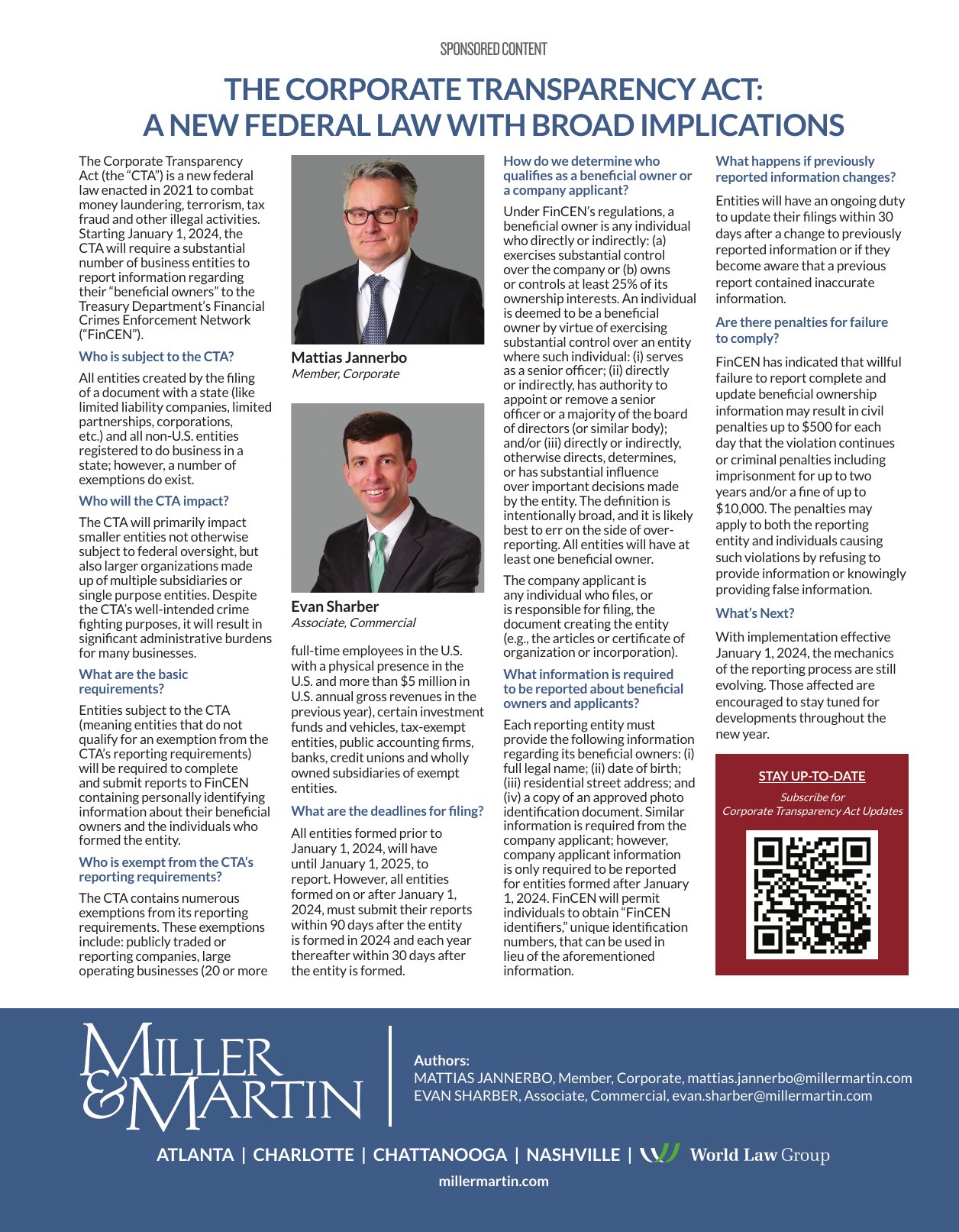The Corporate Transparency Act: A New Federal Law with Broad Implications
Miller & Martin PLLC Alerts | January 03, 2024
Authors: Mattias Jannerbo | Evan Sharber
As first published in the January 2024 issue of Edge magazine
The Corporate Transparency Act (the “CTA”) is a new federal law enacted in 2021 to combat money laundering, terrorism, tax fraud and other illegal activities. Starting January 1, 2024, the CTA will require a substantial number of business entities to report information regarding their “beneficial owners” to the Treasury Department’s Financial Crimes Enforcement Network (“FinCEN”).
Who is subject to the CTA?
All entities created by the filing of a document with a state (like limited liability companies, limited partnerships, corporations, etc.) and all non-U.S. entities registered to do business in a state; however, a number of exemptions do exist.
Who will the CTA impact?
The CTA will primarily impact smaller entities not otherwise subject to federal oversight, but also larger organizations made up of multiple subsidiaries or single purpose entities. Despite the CTA’s well-intended crime fighting purposes, it will result in significant administrative burdens for many businesses.
What are the basic requirements?
Entities subject to the CTA (meaning entities that do not qualify for an exemption from the CTA’s reporting requirements) will be required to complete and submit reports to FinCEN containing personally identifying information about their beneficial owners and the individuals who formed the entity.
Who is exempt from the CTA’s reporting requirements?
The CTA contains numerous exemptions from its reporting requirements. These exemptions include: publicly traded or reporting companies, large operating businesses (20 or more full-time employees in the U.S. with a physical presence in the U.S. and more than $5 million in U.S. annual gross revenues in the previous year), certain investment funds and vehicles, tax-exempt entities, public accounting firms, banks, credit unions and wholly owned subsidiaries of exempt entities.
What are the deadlines for filing?
All entities formed prior to January 1, 2024, will have until January 1, 2025, to report. However, all entities formed on or after January 1, 2024, must submit their reports within 90 days after the entity is formed in 2024 and each year thereafter within 30 days after the entity is formed.
How do we determine who qualifies as a beneficial owner or a company applicant?
Under FinCEN’s regulations, a beneficial owner is any individual who directly or indirectly: (a) exercises substantial control over the company or (b) owns or controls at least 25% of its ownership interests. An individual is deemed to be a beneficial owner by virtue of exercising substantial control over an entity where such individual: (i) serves as a senior officer; (ii) directly or indirectly, has authority to appoint or remove a senior officer or a majority of the board of directors (or similar body); and/or (iii) directly or indirectly, otherwise directs, determines, or has substantial influence over important decisions made by the entity. The definition is intentionally broad, and it is likely best to err on the side of over-reporting. All entities will have at least one beneficial owner.
The company applicant is any individual who files, or is responsible for filing, the document creating the entity (e.g., the articles or certificate of organization or incorporation).
What information is required to be reported about beneficial owners and applicants?
Each reporting entity must provide the following information regarding its beneficial owners: (i) full legal name; (ii) date of birth; (iii) residential street address; and (iv) a copy of an approved photo identification document. Similar information is required from the company applicant; however, company applicant information is only required to be reported for entities formed after January 1, 2024. FinCEN will permit individuals to obtain “FinCEN identifiers,” unique identification numbers, that can be used in lieu of the aforementioned information.
What happens if previously reported information changes?
Entities will have an ongoing duty to update their filings within 30 days after a change to previously reported information or if they become aware that a previous report contained inaccurate information.
Are there penalties for failure to comply?
FinCEN has indicated that willful failure to report complete and update beneficial ownership information may result in civil penalties up to $500 for each day that the violation continues or criminal penalties including imprisonment for up to two years and/or a fine of up to $10,000. The penalties may apply to both the reporting entity and individuals causing such violations by refusing to provide information or knowingly providing false information.
What’s Next?
With implementation effective January 1, 2024, the mechanics of the reporting process are still evolving. Those affected are encouraged to stay tuned for developments throughout the new year.
We Can Help
For more information about the Corporate Transparency Act, contact any of the members of our Corporate Transparency Act Working Group, which includes Evan Sharber, Matt Jannerbo, Bruce McCall, Mike Marshall, and Alan Madison.
Subscribe to our mailing lists to receive future Corporate Transparency Act Updates.
The information and opinions in this bulletin are intended for general guidance only and do not constitute legal advice or a solicitation to provide legal services. This communication does not create a lawyer-client relationship and is not intended as a recommendation for specific situations. As always, readers should consult a qualified attorney for legal guidance. Should you need assistance from a Miller & Martin attorney, please call 1-800-275-7303. Miller & Martin will not be responsible for advising clients of whether they are subject to the Corporate Transparency Act or with respect to their obligations under the Corporate Transparency Act unless we agree (or have already agreed) in writing to the lawyer-client relationship and agree in writing to a scope of services related to the Corporate Transparency Act.


